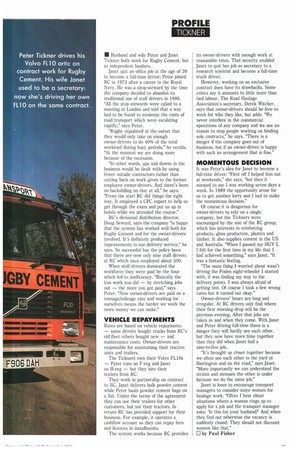• Husband and wife Peter and Janet Tickner both work for Rugby Cement, but as independent hauliers.
Page 35

If you've noticed an error in this article please click here to report it so we can fix it.
Janet quit an office job at the age of 39 to become a full-time driver; Peter joined RC in 1973 after a career in the Royal Navy. He was a shop-steward by the time the company decided to abandon its traditional use of staff drivers in 1986. "All the stop stewards were called to a meeting in London and told that a way had to be found to minimise the costs of road transport which were escalating rapidly," says Peter.
"Rugby stipulated at the outset that they would only take on enough owner-drivers to do 40% of the total workload during busy periods," he recalls. "At the moment we are doing more because of the recession.
"In other words, ups and downs in the business would be dealt with by using fewer outside contractors rather than cutting back on work given to the former employee owner-drivers. And there's been no backsliding on that at all," he says. "From the start RC did things the right way. It employed a CPC expert to help us get through the exam and put us up in hotels while we attended the course."
RC's divisional distribution director, Doug Seward, says the company "is happy that the system has worked well both for Rugby Cement and for the owner-drivers involved. It's definitely produced improvements in our delivery service," he says. So successful has the policy been that there are now only nine staff drivers at RC which once employed about 500.
When staff drivers dominated the workforce they were paid by the hour which led to inefficiency. "Basically the less work you did — by stretching jobs out — the more you got paid," says Peter. "Now owner-drivers are paid on a tonnage/mileage rate and working for ourselves means the harder we work the more money we can make."
VEHICLE REPAYMENTS
Rates are based on vehicle repayments — some drivers bought trucks from RC's old fleet others bought new — and maintenance costs. Owner-drivers are responsible for maintaining their tractive units and trailers.
The Tickners own their Volvo FL1Os — Peter runs an F-reg and Janet an H-reg — but they hire their trailers from RC.
They work in partnership on contract to RC. Janet delivers bulk powder cement while Peter hauls powder cement bags on a fiat.. Under the terms of the agreement they can use their trailers for other customers, but not their tractors. 111 return RC has provided support for their business. For example, it operates a cashflow account so they can repay fees and licences in installments.
The system works because RC provides its owner-drivers with enough work at reasonable rates. That security enabled Janet to quit her job as secretary to a research scientist and become a full-time truck driver.
However, working on an exclusive contract does have its drawbacks. Some critics say it amounts to little more than tied labour. The Road Haulage Association's secretary, Derek Witcher, says that owner-drivers should be free to work for who they like, but adds: "We never interfere in the commercial operations of any company and we see no reason to stop people working on binding sole contracts," he says. 'There is a danger if the company goes out of business, but if an owner-driver is happy with such an arrangement that is fine."
MOMENTOUS DECISION It was Peter's idea for Janet to become a full-time driver: "First off I helped him out at weekends," she says, "but then it seemed to me I was working seven days a week. In 1989 the opportunity arose for us to get another lorry and I had to make the momentous decision."
Of course it is dangerous for owner-drivers to rely on a single company, but the Tickners were encouraged by the size of the RC group, which has interests in reinforcing products, glass production, plastics and timber. It also supplies cement in the US and Australia. "When I passed my HGV I, I felt for the first time in my life that I had achieved something," says Janet. "It was a fantastic feeling.
"The main thing I worried about wasn't driving the Foden eight-wheeler I started with, it was finding my way to the delivery points. I was always afraid of getting lost. Of course I took a few wrong turns but it turned out okay."
Owner-drivers' hours are long and irregular. At RC drivers only find where their first morning drop will be the previous evening. After that jobs are taken as and when they come. With Janet and Peter driving full-time there is a danger they will hardly see each other, but they now have more time together than they did when Janet had a nine-to-five job.
"It's brought us closer together because we often see each other in the yard at Barrington and on the road," says Janet. "More importantly we can understand the strains and stresses the other is under because we do the same job."
Janet is keen to encourage transport managers to consider more women for haulage work. "Often I hear about situations where a woman rings up to apply for a job and the transport manager asks: 'Is this for your husband?' And when they find out otherwise the vacancy is suddenly closed. They should not discount women like that."
0 by Paul Fisher




























































































